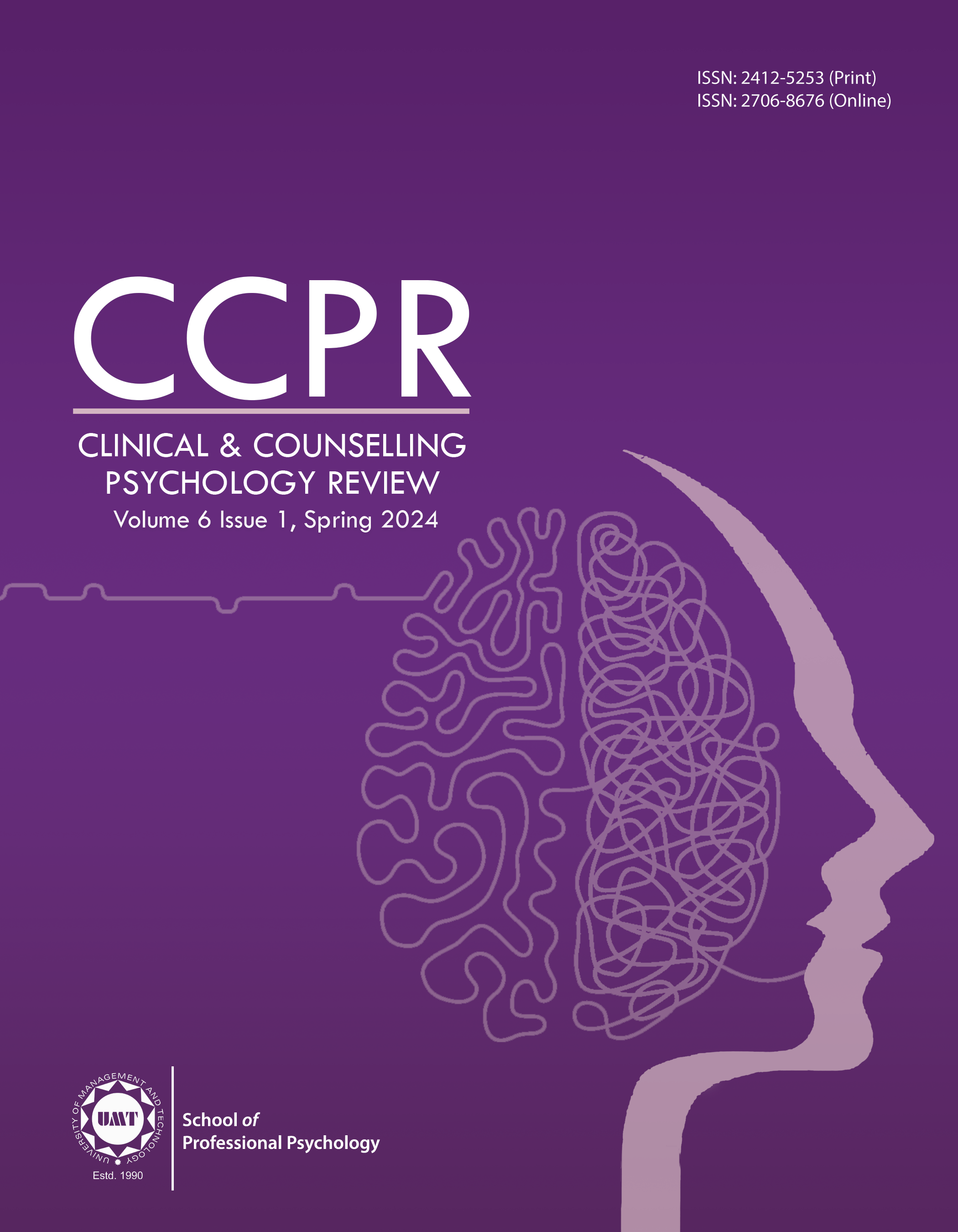Attachment Styles, Love Styles, and Romantic Jealousy among Late Adolescents and Young Adults: An Analytical Study
Abstract
 Abstract Views: 0
Abstract Views: 0
The current study aims to discuss the relationship among attachment styles, love styles, and romantic jealousy in late adolescents and young adults. Correlational research method was used and data was collected through purposive sampling technique. The sample comprised of males (N = 177) and females (N = 128). Revised Adult Attachment Scale, Love Attitude Scale (short form), and Multidimensional Jealousy Scale were used for data collection. The analysis showed significant correlation of mania and ludus love styles with anxious attachment style. Anxious attachment, mania, and ludus love were found positively associated with cognitive jealousy, emotional jealousy, and behavioral jealousy. Moreover, close love style was significantly correlated with eros love style and depend attachment style was positively correlated with pragma and eros love styles. Linear regression was applied to find out the predictions. Ludus love style was significantly predicted by anxious attachment, while close attachment was a significant predictor of eros love style. However, depend attachment significantly predicted pragma love style. Hence, the study has practical implications in family and relationship counselling. It will help to better understand the relationship problems that are rapidly prevailing in our culture.
Downloads
References
Agus, M., Puddu, L., & Raffagnino, R. (2021). Exploring the similarity of partners’ love styles and their relationships with marital satisfaction: A dyadic approach. SAGE Open, 11(4), 1–9. https://doi.org/10.1177/21582440211040785
Aloyce, D., Mshana, G., Peter, E., Malibwa, D., Buller, A. M., Mchome, Z., Kapiga, S., & Stöckl, H. (2023). Pathways of romantic jealousy to intimate partner violence in Mwanza, northern Tanzania. Family Relations, 73(2), 843–857. https://doi.org/10.1111/fare.12880
Alyana, S. I., Aslam, T., Fatima, B., & Gulzar, M. (2023). Insecure attachment styles and obsessive love among emerging adults. Pakistan Journal of Psychology, 54(1), 35–45.
Andersen, P. A., Eloy, S. V., Guerrero, L. K., & Spitzberg, B. H. (1995). Romantic jealousy and relational satisfaction: A look at the impact of jealousy experience and expression. Communication Reports, 8(2), 77–85. https://doi.org/10.1080/08934219509367613
Arshad, A., & Imran, N. H. (2023). Partner phubbing, romantic jealousy and marital satisfaction among married individuals. Applied Psychology Review, 1(2), 1–6. https://doi.org/10.32350/apr.12.01
Barelds, D. P. H., & Barelds‐Dijkstra, P. (2007). Relations between different types of jealousy and self and partner perceptions of relationship quality. Clinical Psychology & Psychotherapy/Clinical Psychology and Psychotherapy, 14(3), 176–188. https://doi.org/10.1002/cpp.532
Baumeister, R. F. (2012). Need-to-Belong theory. In P. A.Van Lange, E. T. Higgins, & A. W. Kruglanski (Eds.), Handbook of theories of social psychology (pp. 121–140). Sage Publications.
Bowlby, J. (1969). Attachment: Attachment and loss (vol. 1). Penguin Books.
Cheema, S. T., & Malik, J. A. (2021). Expectations in romantic relations and psychological well-being of adolescents in Pakistan: Moderating role of parental support. Psychologica Belgica, 61(1), 79–87. https://doi.org/10.5334/pb.556
Coban, E., & Bhogal, M. S. (2018, March 19). A brief report on the relationship between attachment style, self-esteem, and multidimensional romantic jealousy. OSFramework. https://osf.io/nxd5w/
Collins‚ N. L. (1996). Working models of attachment: Implications for explanation‚ emotion‚ and behavior. Journal of Personality and Social Psychology‚ 71‚ 810–832 https://doi.org/10.1037//0022-3514.71.4.810
Elphinston, R. A., Feeney, J. A., & Noller, P. (2011). Measuring romantic jealousy: Validation of the multidimensional jealousy scale in Australian samples. Australian Journal of Psychology, 63(4), 243–251. https://doi.org/10.1111/j.1742-9536.2011.00026.x
Goodboy, A. K., Horan, S. M., & Booth-Butterfield, M. (2012). Intentional Jealousy-Evoking behavior in romantic relationships as a function of received partner affection and love styles. Communication Quarterly, 60(3), 370–385. https://doi.org/10.1080/01463373.2012.688792
Güçlü, O., Şenormancı, Ö., Şenormancı, G., & Köktürk, F. (2017). Gender differences in romantic jealousy and attachment styles. Psychiatry and Clinical Psychopharmacology, 27(4), 359–365. https://doi.org/10.1080/24750573.2017.1367554
Hendrick, C., & Hendrick, S. S. (1986). A Theory and Method of Love. Journal of Personality and Social Psychology, 50, 392–402. https://doi.org/10.1037/0022-3514.50.2.392
Heshmati, S., Oravecz, Z., Pressman, S., Batchelder, W. H., Muth, C., & Vandekerckhove, J. (2017). What does it mean to feel loved: Cultural consensus and individual differences in felt love. Journal of Social and Personal Relationships, 36(1), 214–243. https://doi.org/10.1177/0265407517724600
Lee, J. A. (1977). A typology of styles of loving. Personality & Social Psychology Bulletin, 3(2), 173–182. https://doi.org/10.1177/014616727700300204
Li, T., & Chan, D. K. (2012). How anxious and avoidant attachment affect romantic relationship quality differently: A meta-analytic review. European Journal of Social Psychology, 42(4), 406–419. https://doi.org/10.1002/ejsp.1842
Pfeiffer, S. M., & Wong, P. T. P. (1989). Multidimensional jealousy. Journal of Social and Personal Relationships, 6(2), 181–196. https://doi.org/10.1177/026540758900600203
Sbarra, D. A., & Hazan, C. (2008). Coregulation, dysregulation, self- regulation: An integrative analysis and empirical agenda for understanding adult attachment, separation, loss, and recovery. Personality and Social Psychology Review, 12(2), 141–167. https://doi.org/10.1177/1088868308315702
Shaver, P. R., & Hazan, C. (1988). A biased overview of the study of love. Journal of Social and Personal Relationships, 5(4), 473–501.
Simpson, J. A., & Rholes, W. S. (2017). Adult attachment, stress, and romantic relationships. Current Opinion in Psychology, 13, 19–24. https://doi.org/10.1016/j.copsyc.2016.04.006
Zahid, H., & Tariq, S. (2020). Romantic jealousy and partner responsiveness as predictors of marital conflict. Pakistan Journal of Social Sciences, 40(4), 1641–1651.








